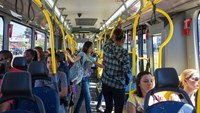
Volvo Buses highlights the benefits of electromobility and launches the world’s largest bus in Rio. Historic C40 Mayors Summit sees city leaders from around the world gather in Mexico to discuss a low carbon future. Outdoor air pollution is now the biggest single killer in the world1. The toll of toxic air is expected to double as urban populations increase and the number of cars in the world reaches 2bn by 2050 (2)
Outdoor air pollution levels have risen dramatically and in March, World Health Organisation (WHO) warned that levels have risen 8% globally in the past 5 years3. Billions of people are exposed to dangerous air and outdoor air pollution now causes more than 3 million of deaths a year – more than malaria and HIV/Aids4.
Following the UN’s 2015 Climate Change Conference in Paris (COP21), mayors from around the world gather in Mexico City to discuss the growing climate change crisis. They will urge immediate action to address the unacceptable levels of pollution facing major urban areas. Academics, city planners and a host of experts will discuss energy efficiency, low carbon transport and climate resilience amongst other current sustainability issues.
The number of expected bus journeys taken in cities is expected to grow by nearly 50% by 20305 and will hopefully reduce the number of private cars on the roads. However, buses travel up to 10 times further than the average passenger vehiclemaking their emissions impact greater6 – particularly those that are poorly maintained and in need of renewal.
Volvo has supplied 3,000 hybrid and electric buses globally and the number continues to rise with the highest number of vehicles circulating in UK, Colombia, Sweden, Spain and Germany. The brand also recently unveiled the world’s largest bus at FetransRio which has capacity for up to 300 people. The vehicle is 30 meters in length and was designed to cater for the needs of Bus Rapid Transit systems (BRT) and provide more efficient transportation in addition to reducing fleet sizes and emissions.
Cities are being urged to adopt electromobility transport solutions and include electric and hybrid vehicles. Last year, 26 global cities signed the C40 Clean Bus Declaration to shift part of their fleets to “clean” vehicles. If all 26 cities switched their entire fleet to Low Emission Vehicles (LEV), 2.8 tons of greenhouse gas (GHG) emissions could be saved each year – the equivalent of taking almost 590,000 cars off the road7.
Håkan Agnevall, President of Volvo Bus Corporation said: “Cities around the world are taking positive steps in addressing the global transport issues by initiating LEV systems. As both environmentally clean and comfortable, we believe electric bus systems are the future of urban public transport.”
Modern electrical buses are also quiet and can be equipped with other services including Wi-Fi. The latest in electric bus innovation also allows for ground-breaking applications for city planners, including indoor libraries or leisure center bus stops.
About Volvo Buses.jpg)
Volvo Buses is one of the world’s leading brands of buses and coaches, operating in more than 140 countries. We are driven by a passion to help create the cities of the future, free from congestion, emissions and noise. Our mission is to help operators and communities offer people safe, clean and efficient transportation to and from work, around the city or across the continent. We do so by striving to be the ultimate provider of sustainable transport solutions.




Comments
There are no comments yet for this item
Join the discussion